PNG 2024 CEO100 Survey
Last year, profits fell short of expectations and yet CEOs remain optimistic about profits in 2024 while recruitment and investment expectations have held onto most of their 2023 gains. So despite the delay to the Papua LNG Project, PNG businesses remain optimistic about the outlook.

For the chart pack from the presentation to the POMCCI Breakfast 20th March 2024 see Westpac Business Advantage CEO100 2024 (PDF 2MB)
Since 2012 Business Advantage International has run the annual PNG 100 CEO Survey of senior PNG executives. It explores the CEOs’ expectations for profits, investment and employment, as well as how the previous year’s profits compared to expectations. Perhaps most importantly, though, it uncovers critical impediments facing PNG businesses.
The 2024 survey found that while 2023 profits fell short of expectations, CEOs are nevertheless expecting profits to improve this year. For 2024, recruitment and investment expectations have held onto most of their 2023 improvement. The top six critical impediments to PNG businesses are, in order of importance: availability of foreign exchange, security/law & order, unreliable utilities, lack of government capacity, the shortage of skills & expertise and regulatory uncertainty.
The survey was conducted from November 2023 to January 2024 with respondents surveyed before the recent outbreak of civil unrest in Port Moresby. Despite that, 88% said security/law & order was either mission critical or very important, compared with 65% in 2023. Given recent events, if the survey had been re-run now, security/law & order would probably be listed as the top-ranking issue.
Concerns about inflation lifted to the highest level in the history of the survey, with 62% of firms suggesting it is a mission critical issue, or a very important concern. Even so, it did not make the top six among significant issues, highlighting how significant the other issues are. Inflation did, however, rise from the rank of eighth in 2023, when 55% mentioned inflation as a mission critical issue or a very important concern, to seventh.
From the 2024 survey, we have identified five key highlights:
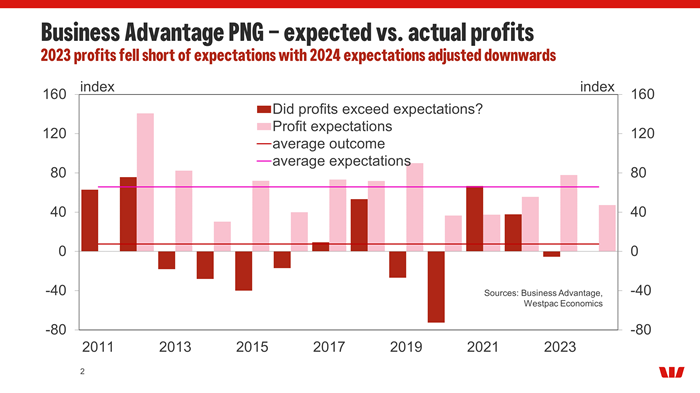
1. Profits are expected to grow but given the disappointment last year, they have moderated for 2024.
The Profit Expectation Index eased back to 47.2 in 2024, down from 77.8 in 2023 and below the longer-term average of 65.8. Highlighting this shift, the number of respondents expecting profits to substantially exceed, or somewhat exceed, last year has fallen from 38% to 28%. This is not surprising given that 38% of respondents reported that profits fell slightly below expectations for 2023, taking the outcomes index down to –5.4, below its long-term average of 7.5. So, while the profit outlook remains positive, it has taken a hit from the difficulties experienced in 2023 resulting in a muted outlook for 2024.
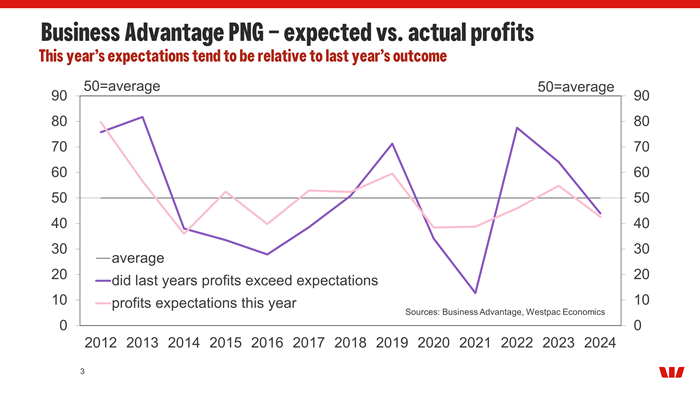
As noted above the Profit Expectations Index tends to be significantly positive while the Profit Outcome Index tends to be only slightly positive, with an average of 7.5. This is not surprising given that firms tend to be optimistic about growth opportunities. Adjusting both series for their long-run average makes it clearer that the Profit Expectations Index tends to rise after a year of strong profits and fall after a year of weak profits. It is also worth noting that this years profit expecatations are just a touch less than average.
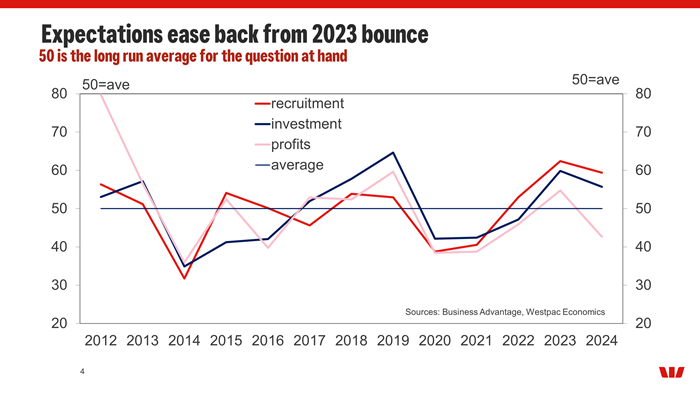
2. Despite profits expectations below the long-run average, recruitment and investment held up.
In 2023 the Recruitment Expectation Index surged to a historical high of 84.6, significantly stronger than the previous high of 66.7 in 2012 and well above the historical average of 47.9. This is a promising sign for stronger growth in employment continuing, following on from the growth in non-minerals employment of +2.9%yr at September 2023. Move forward to the 2024 CEO100 Survey, the Recruitment Expectations Index eased back to 75.7 with the share of those expecting either a substantial or slight increase in staff falling from 64.1% to 62.1%. Nevertheless, at 75.7 the index is well above the long-run average of 47.9, so while it is pointing to a slightly more modest pace of employment growth, it is still consistent with non-minerals employment growing through 2024.
The Investment Expectations Index rose to 97 .4 in 2023, the highest since 2019 (113.3) and well above the long-run average of 65.0. This year, the Investment Expectations Index fell to 83.8 with the share of those expecting either a substantial or slight increase in investment falling from 71.8% to 64.9%. As such, we think that investment can remain an important source of growth for the PNG economy even it might be a bit softer than it was in 2023.
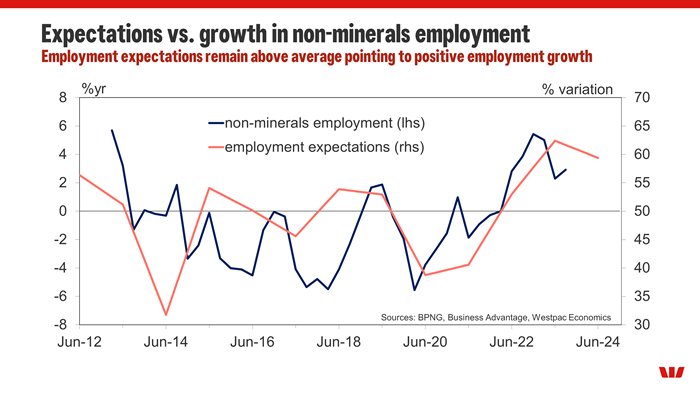
It is unusual for both the Recruitment and the Investment Indexes to hold well above their longer-term averages when the Profits Index is well below. This may be, in part, due to rising inflationary pressure (as noted by the rise in firms reporting inflation as a critical concern), with the belief this pressure will be temporary. As such, firms are prepared to take a bit of a hit on profit while keeping a focus on growth via recruitment and investment. If this is the case, then it is vital that policy focuses on supporting PNG businesses through 2024. If instead profits disappoint again, it is likely to put 2025 employment and investment decisions at risk.
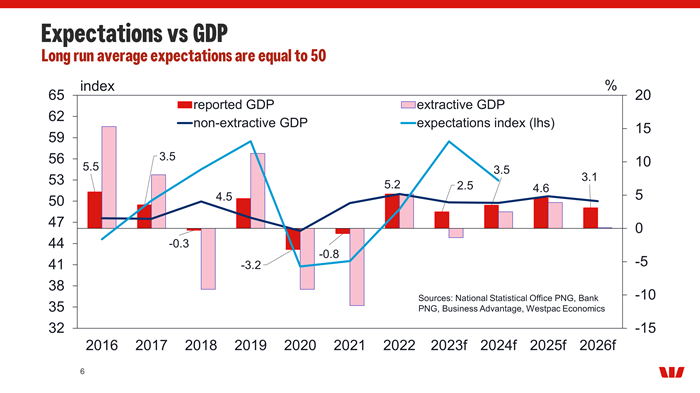
3. With investment and recruitment holding up, the 2024 Business Conditions Index remains positive even if it is not as strong as it was in 2023.
Westpac combines the expectations for profits, investment and recruitment into a single index, the Business Conditions Index.
The Business Conditions Index softened in the 2024 survey, falling back to 68.9 from 2023’s strong reading of 93.3. The short history of the series, and the disruption from the COVID lockdowns in 2020 and 2021, make it difficult to draw a clear relationship between the Business Conditions Index and economic growth. However, the above-average result is still a positive sign, particularly for non-extractive (non-minerals) growth.
4. The lack of foreign exchange returns is the most critical impediment facing PNG businesses.
From 2016 to 2019, as liquidity improved in the foreign exchange market, FX dropped down the list as a critical impediment. In 2020 it popped back to be the most significant constraint only to be beaten by the COVID-19 restrictions in 2021. It then eased further in 2022 suggesting further improvement in market liquidity until the BPNG shifted focus to fighting inflation thus placing an increased emphasis on currency stability. As a result, foreign exchange as a critical impediment surged to an average score of 4.1 out of 5 in 2023 to again be the leading impediment. CEOs reported that the situation deteriorated further through 2023 with the 2024 survey reporting FX concerns lifting to 4.6, the highest reported level of concern about any factor in the history of the survey. So, despite the BPNG allowing a modest devaluation of the kina through the second half of 2023, 93.9% of firms reported that FX was a mission critical or very important concern.
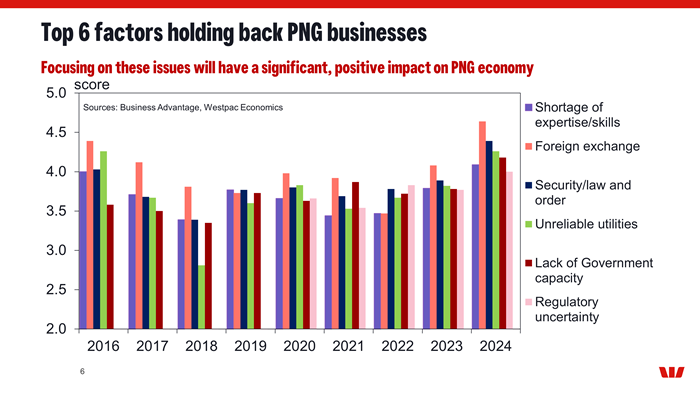
5. Security/law & order, unreliable utilities and the lack of government capacity are all significant hinderances to PNG businesses.
Security/law & order have been a consistent issue. Our review of the 2023 survey suggested that the smooth transition to the Marape administration raised hope that these concerns would ease through the year. In the end, this was not the case. Even before the recent Port Moresby riots the level of concern lifted to 4.4, with 88% of firms citing security/law & order was a mission critical issue or very important concern. This result was on par with the previous high in 2013, following 2012’s political unrest including a limited military mutiny. If the survey were re-run after the recent riots, these concerns would be likely to have increased further.
Since 2019 the concern about unreliable utilities has been high but relatively stable, scoring between 3.5 to 3.8. However, in 2024 it jumped to 4.3, the highest level of concern for utilities in the history of the survey . With 88% of CEOs reporting the unreliable utilities were a mission critical issue or very important concern, its rank lifted from 4 in 2023 to 3 in 2024.
What is also a critical highlight is the jump in concern about the lack of government capacity. This concern scored 3.8 in 2023 and had been ranging between 3.4 and 3.9 since 2014. However, in 2024 it jumped to 4.2, the highest level for this question in the history of the survey, taking it from a rank of 6 to 4. More than 80% of CEOs reported that the lack of government capacity was a mission critical issue or a very important concern.
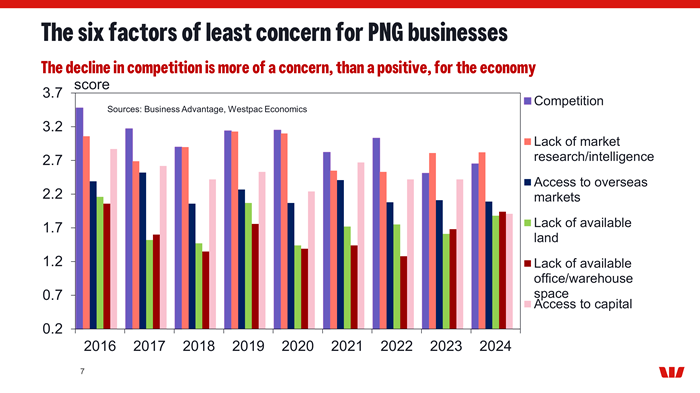
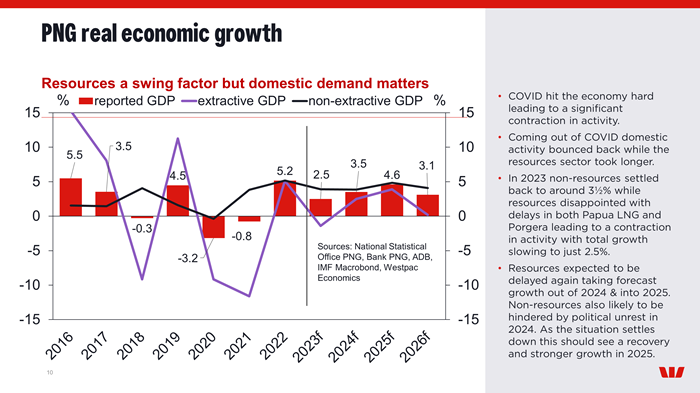
Stay informed with Westpac IQ
Get the latest reports straight to your inbox.
Browse topics
Disclaimer
©2026 Westpac Banking Corporation ABN 33 007 457 141 (including where acting under any of its Westpac, St George, Bank of Melbourne or BankSA brands, collectively, “Westpac”). References to the “Westpac Group” are to Westpac and its subsidiaries and includes the directors, employees and representatives of Westpac and its subsidiaries.
Things you should know
We respect your privacy: You can view the New Zealand Privacy Policy here, or the Australian Group Privacy Statement here. Each time someone visits our site, data is captured so that we can accurately evaluate the quality of our content and make improvements for you. We may at times use technology to capture data about you to help us to better understand you and your needs, including potentially for the purposes of assessing your individual reading habits and interests to allow us to provide suggestions regarding other reading material which may be suitable for you.
This information, unless specifically indicated otherwise, is under copyright of the Westpac Group. None of the material, nor its contents, nor any copy of it, may be altered in any way, transmitted to, copied of distributed to any other party without the prior written permission of the Westpac Group.
Disclaimer
This information has been prepared by Westpac and is intended for information purposes only. It is not intended to reflect any recommendation or financial advice and investment decisions should not be based on it. This information does not constitute an offer, a solicitation of an offer, or an inducement to subscribe for, purchase or sell any financial instrument or to enter into a legally binding contract. To the extent that this information contains any general advice, it has been prepared without taking into account your objectives, financial situation or needs and before acting on it you should consider the appropriateness of the advice. Certain types of transactions, including those involving futures, options and high yield securities give rise to substantial risk and are not suitable for all investors. We recommend that you seek your own independent legal or financial advice before proceeding with any investment decision.
This information may contain material provided by third parties. While such material is published with the necessary permission none of Westpac or its related entities accepts any responsibility for the accuracy or completeness of any such material. Although we have made every effort to ensure this information is free from error, none of Westpac or its related entities warrants the accuracy, adequacy or completeness of this information, or otherwise endorses it in any way. Except where contrary to law, Westpac Group intend by this notice to exclude liability for this information. This information is subject to change without notice and none of Westpac or its related entities is under any obligation to update this information or correct any inaccuracy which may become apparent at a later date. This information may contain or incorporate by reference forward-looking statements. The words “believe”, “anticipate”, “expect”, “intend”, “plan”, “predict”, “continue”, “assume”, “positioned”, “may”, “will”, “should”, “shall”, “risk” and other similar expressions that are predictions of or indicate future events and future trends identify forward-looking statements. These forward-looking statements include all matters that are not historical facts. Past performance is not a reliable indicator of future performance, nor are forecasts of future performance. Whilst every effort has been taken to ensure that the assumptions on which any forecasts are based are reasonable, the forecasts may be affected by incorrect assumptions or by known or unknown risks and uncertainties. The ultimate outcomes may differ substantially from any forecasts.
Conflicts of Interest: In the normal course of offering banking products and services to its clients, the Westpac Group may act in several capacities (including issuer, market maker, underwriter, distributor, swap counterparty and calculation agent) simultaneously with respect to a financial instrument, giving rise to potential conflicts of interest which may impact the performance of a financial instrument. The Westpac Group may at any time transact or hold a position (including hedging and trading positions) for its own account or the account of a client in any financial instrument which may impact the performance of that financial instrument.
Author(s) disclaimer and declaration: The author(s) confirms that (a) no part of his/her compensation was, is, or will be, directly or indirectly, related to any views or (if applicable) recommendations expressed in this material; (b) this material accurately reflects his/her personal views about the financial products, companies or issuers (if applicable) and is based on sources reasonably believed to be reliable and accurate; (c) to the best of the author’s knowledge, they are not in receipt of inside information and this material does not contain inside information; and (d) no other part of the Westpac Group has made any attempt to influence this material.
Further important information regarding sustainability-related content: This material may contain statements relating to environmental, social and governance (ESG) topics. These are subject to known and unknown risks, and there are significant uncertainties, limitations, risks and assumptions in the metrics, modelling, data, scenarios, reporting and analysis on which the statements rely. In particular, these areas are rapidly evolving and maturing, and there are variations in approaches and common standards and practice, as well as uncertainty around future related policy and legislation. Some material may include information derived from publicly available sources that have not been independently verified. No representation or warranty is made as to the accuracy, completeness or reliability of the information. There is a risk that the analysis, estimates, judgements, assumptions, views, models, scenarios or projections used may turn out to be incorrect. These risks may cause actual outcomes to differ materially from those expressed or implied. The ESG-related statements in this material do not constitute advice, nor are they guarantees or predictions of future performance, and Westpac gives no representation, warranty or assurance (including as to the quality, accuracy or completeness of the statements). You should seek your own independent advice.
Additional country disclosures:
Australia: Westpac holds an Australian Financial Services Licence (No. 233714). You can access Westpac’s Financial Services Guide here or request a copy from your Westpac point of contact. To the extent that this information contains any general advice, it has been prepared without taking into account your objectives, financial situation or needs and before acting on it you should consider the appropriateness of the advice.
New Zealand: In New Zealand, Westpac Institutional Bank refers to the brand under which products and services are provided by either Westpac (NZ division) or Westpac New Zealand Limited (company number 1763882), the New Zealand incorporated subsidiary of Westpac ("WNZL"). Any product or service made available by WNZL does not represent an offer from Westpac or any of its subsidiaries (other than WNZL). Neither Westpac nor its other subsidiaries guarantee or otherwise support the performance of WNZL in respect of any such product. WNZL is not an authorised deposit-taking institution for the purposes of Australian prudential standards. The current disclosure statements for the New Zealand branch of Westpac and WNZL can be obtained at the internet address www.westpac.co.nz.
Singapore: This material has been prepared and issued for distribution in Singapore to institutional investors, accredited investors and expert investors (as defined in the applicable Singapore laws and regulations) only. Recipients of this material in Singapore should contact Westpac Singapore Branch in respect of any matters arising from, or in connection with, this material. Westpac Singapore Branch holds a wholesale banking licence and is subject to supervision by the Monetary Authority of Singapore.
Fiji: Unless otherwise specified, the products and services for Westpac Fiji are available from www.westpac.com.fj © Westpac Banking Corporation ABN 33 007 457 141. This information does not take your personal circumstances into account and before acting on it you should consider the appropriateness of the information for your financial situation. Westpac Banking Corporation ABN 33 007 457 141 is incorporated in NSW Australia and registered as a branch in Fiji. The liability of its members is limited.
Papua New Guinea: Unless otherwise specified, the products and services for Westpac PNG are available from www.westpac.com.pg © Westpac Banking Corporation ABN 33 007 457 141. This information does not take your personal circumstances into account and before acting on it you should consider the appropriateness of the information for your financial situation. Westpac Banking Corporation ABN 33 007 457 141 is incorporated in NSW Australia. Westpac is represented in Papua New Guinea by Westpac Bank - PNG - Limited. The liability of its members is limited.
U.S.: Westpac operates in the United States of America as a federally licensed branch, regulated by the Office of the Comptroller of the Currency. Westpac is also registered with the US Commodity Futures Trading Commission (“CFTC”) as a Swap Dealer, but is neither registered as, or affiliated with, a Futures Commission Merchant registered with the US CFTC. The services and products referenced above are not insured by the Federal Deposit Insurance Corporation (“FDIC”). Westpac Capital Markets, LLC (‘WCM’), a wholly-owned subsidiary of Westpac, is a broker-dealer registered under the U.S. Securities Exchange Act of 1934 (‘the Exchange Act’) and member of the Financial Industry Regulatory Authority (‘FINRA’). In accordance with APRA's Prudential Standard 222 'Association with Related Entities', Westpac does not stand behind WCM other than as provided for in certain legal agreements between Westpac and WCM and obligations of WCM do not represent liabilities of Westpac.
This communication is provided for distribution to U.S. institutional investors in reliance on the exemption from registration provided by Rule 15a-6 under the Exchange Act and is not subject to all of the independence and disclosure standards applicable to debt research reports prepared for retail investors in the United States. WCM is the U.S. distributor of this communication and accepts responsibility for the contents of this communication. Transactions by U.S. customers of any securities referenced herein should be effected through WCM. All disclaimers set out with respect to Westpac apply equally to WCM. If you would like to speak to someone regarding any security mentioned herein, please contact WCM on +1 212 389 1269. Investing in any non-U.S. securities or related financial instruments mentioned in this communication may present certain risks. The securities of non-U.S. issuers may not be registered with, or be subject to the regulations of, the SEC in the United States. Information on such non-U.S. securities or related financial instruments may be limited. Non-U.S. companies may not be subject to audit and reporting standards and regulatory requirements comparable to those in effect in the United States. The value of any investment or income from any securities or related derivative instruments denominated in a currency other than U.S. dollars is subject to exchange rate fluctuations that may have a positive or adverse effect on the value of or income from such securities or related derivative instruments.
The author of this communication is employed by Westpac and is not registered or qualified as a research analyst, representative, or associated person of WCM or any other U.S. broker-dealer under the rules of FINRA, any other U.S. self-regulatory organisation, or the laws, rules or regulations of any State. Unless otherwise specifically stated, the views expressed herein are solely those of the author and may differ from the information, views or analysis expressed by Westpac and/or its affiliates.
UK: The London branch of Westpac is authorised in the United Kingdom by the Prudential Regulation Authority (PRA) and is subject to regulation by the Financial Conduct Authority (FCA) and limited regulation by the PRA (Financial Services Register number: 124586). The London branch of Westpac is registered at Companies House as a branch established in the United Kingdom (Branch No. BR000106). Details about the extent of the regulation of Westpac’s London branch by the PRA are available from us on request.
This communication is not being made to or distributed to, and must not be passed on to, the general public in the United Kingdom. Rather, this communication is being made only to and is directed at (a) those persons falling within the definition of Investment Professionals (set out in Article 19(5) of the Financial Services and Markets Act 2000 (Financial Promotion) Order 2005 (the “Order”)); (b) those persons falling within the definition of high net worth companies, unincorporated associations etc. (set out in Article 49(2)of the Order; (c) other persons to whom it may lawfully be communicated in accordance with the Order or (d) any persons to whom it may otherwise lawfully be made (all such persons together being referred to as “relevant persons”). Any person who is not a relevant person should not act or rely on this communication or any of its contents. In the same way, the information contained in this communication is intended for “eligible counterparties” and “professional clients” as defined by the rules of the Financial Conduct Authority and is not intended for “retail clients”. Westpac expressly prohibits you from passing on the information in this communication to any third party.
European Economic Area (“EEA”): This material may be distributed to you by either: (i) Westpac directly, or (ii) Westpac Europe GmbH (“WEG”) under a sub-licensing arrangement. WEG has not edited or otherwise modified the content of this material. WEG is authorised in Germany by the Federal Financial Supervision Authority (‘BaFin’) and subject to its regulation. WEG’s supervisory authorities are BaFin and the German Federal Bank (‘Deutsche Bundesbank’). WEG is registered with the commercial register (‘Handelsregister’) of the local court of Frankfurt am Main under registration number HRB 118483. In accordance with APRA’s Prudential Standard 222 ‘Association with Related Entities’, Westpac does not stand behind WEG other than as provided for in certain legal agreements (a risk transfer, sub-participation and collateral agreement) between Westpac and WEG and obligations of WEG do not represent liabilities of Westpac. Any product or service made available by WEG does not represent an offer from Westpac or any of its subsidiaries (other than WEG). All disclaimers set out with respect to Westpac apply equally to WEG.
This communication is not intended for distribution to, or use by any person or entity in any jurisdiction or country where such distribution or use would be contrary to local law or regulation.
This communication contains general commentary, research, and market colour. The communication does not constitute investment advice. The material may contain an ‘investment recommendation’ and/or ‘information recommending or suggesting an investment’, both as defined in Regulation (EU) No 596/2014 (including as applicable in the United Kingdom) (“MAR”). In accordance with the relevant provisions of MAR, reasonable care has been taken to ensure that the material has been objectively presented and that interests or conflicts of interest of the sender concerning the financial instruments to which that information relates have been disclosed.
Investment recommendations must be read alongside the specific disclosure which accompanies them and the general disclosure which can be found here. Such disclosure fulfils certain additional information requirements of MAR and associated delegated legislation and by accepting this communication you acknowledge that you are aware of the existence of such additional disclosure and its contents.
To the extent this communication comprises an investment recommendation it is classified as non-independent research. It has not been prepared in accordance with legal requirements designed to promote the independence of investment research and therefore constitutes a marketing communication. Further, this communication is not subject to any prohibition on dealing ahead of the dissemination of investment research.

